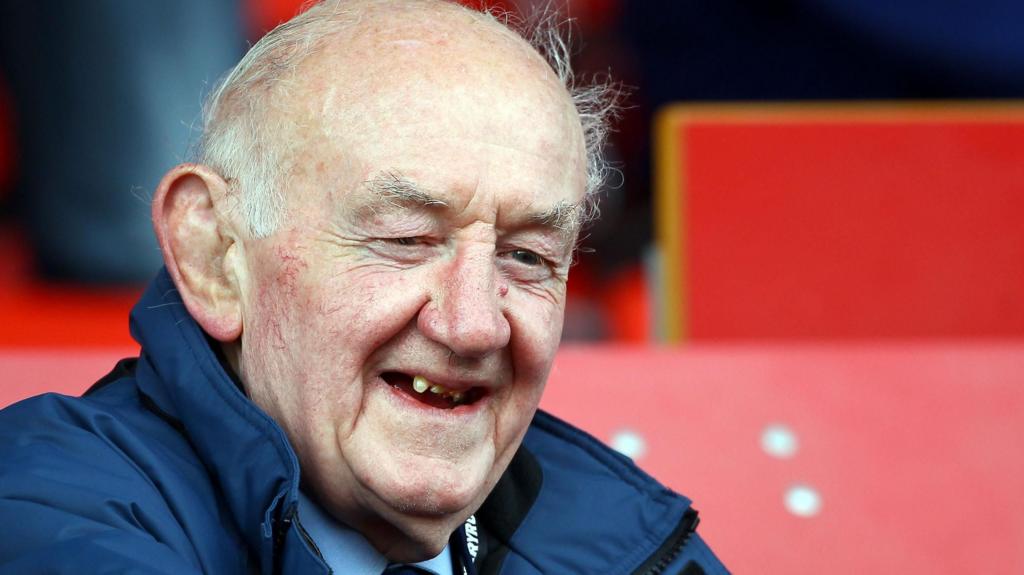This video can not be played
A tribute to rugby legend Ray French
For a generation who grew up watching rugby league on television, Ray French’s voice became synonymous with the sport’s golden era during the 1980s and 1990s.
In that period, rugby league was a fixture on Saturday afternoon’s Grandstand, drawing a nationwide audience to matches primarily held in northern English towns and cities such as Wigan, Castleford, Oldham, and Hull.
It was a time when the sport enjoyed a broader appeal, with players like Ellery Hanley, Garry Schofield, Martin Offiah, and international stars such as Mal Meninga becoming household names.
Ray French was also among them.
Ray French (second row, third from left) stands proudly with his Great Britain team-mates before the 1968 World Cup
However, French’s contributions extended beyond his role as an iconic broadcaster. He complemented his commentary with a distinguished playing career.
Away from the field, Ray was a respected teacher in his hometown of St Helens – a profession that instilled a sense of groundedness that would prove invaluable in his broadcasting career.
His talent propelled him from a working-class background in the north to the upper echelons of English rugby union, where he earned international recognition in the 15-player code.
St Helens recognized his qualities and brought him back to play rugby league, where he became part of a successful team alongside fellow Saints legends like Kel Coslett, Tom van Vollenhoven, and his future commentary partner, Alex Murphy.
French concluded his playing career at Widnes, achieving the distinction of becoming a dual-code international when he represented Great Britain and participated in the 1968 World Cup squad, alongside stars like Roger Millward, Neil Fox, and Cliff Watson.
Known for his intelligent play, he possessed an astute passing ability combined with the physical resilience required to play second-row in the fiercely competitive environment of the 1960s.
Ray French’s golden BBC commentary moments
Despite his on-field achievements, it was French’s distinctive voice, tone, and vocabulary in his second rugby league career that captivated many, including those from outside the sport’s heartlands, and inspired a love for the game and his exceptional commentary.
He faced a significant challenge in following in the footsteps of Eddie Waring, a pioneering figure who brought rugby league into the mainstream and built a career in light entertainment, becoming a well-known personality in the broadcasting industry.
French’s focus was not on celebrity; instead, he aimed to showcase the sport in the best possible light.
From his first Challenge Cup final in 1982 to his last in 2008, and encompassing numerous Test matches and international games, French’s unique style immortalized some of the greatest players and moments in the sport’s history.
Consider the 1985 Wigan versus Hull Challenge Cup final, often regarded as the ultimate.
“He can step on a threepenny bit this lad!” exclaimed French as John Ferguson skillfully navigated the narrowest of spaces to score for Wigan.
His emotive language and enthusiastic tone conveyed excitement and passion.
The greatest Challenge Cup final ever?
Nine years later, Jonathan Davies outpaced Australia’s speedy Brett Mullins to score a remarkable try – again, on the hallowed turf of Wembley Stadium.
“He’s got the head back! The Welshman is in for a magnificent try.”
It was a perfectly captured commentary of one of Great Britain’s most memorable tries.
Perhaps the most iconic moment was his description of Martin Offiah’s sensational length-of-the-field try for Wigan in the 1994 Challenge Cup final against Leeds, just months before Davies’ heroics.
Offiah, overwhelmed after scoring, could barely acknowledge his achievement as he knelt down, overcome with emotion. French found the perfect words.
“That must rank among the finest ever seen on this ground.”
A moment captured to perfection.
Like many commentators, he had his signature phrases, with “He’s going for the line!” being a notable example. His fondness for mentioning a player’s weight and amateur club was another endearing quirk that fans came to appreciate.
The combination of his melodic voice, shaped by his St Helens upbringing, his rich vocabulary, his authentic connection to rugby league, and his excellent rapport with Joe Lydon, Maurice Bamford, former teammate Murphy, and later with those he had commentated on as they scored, such as Davies, solidified Ray’s status as an iconic voice.
Ray and good friend Allan Rooney covered countless games for BBC Radio Merseyside together in his later years
Beyond his professional abilities, those who worked with Ray will remember him as a genuinely kind person.
Players, coaches, directors, owners, and fans encountered an engaging, friendly, humble, and kind man who was always eager to discuss his beloved sport.
Despite being the leading figure for rugby league at the BBC for many years, he never forgot his roots and upbringing.
In his later years, Ray continued to provide commentary for Radio Merseyside, often alongside his close friend Allan Rooney, and it was a pleasure to listen to their stories, banter, and anecdotes.
It was akin to encountering broadcasting legends like Barry Davies or John Motson at your local club, yet for Ray, it was simply business as usual.
Ray French will forever be remembered as rugby league royalty and a broadcasting legend.

